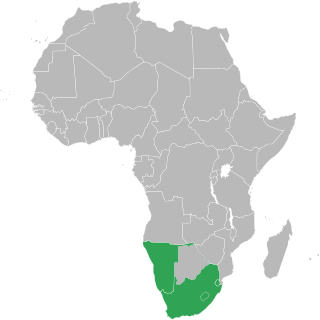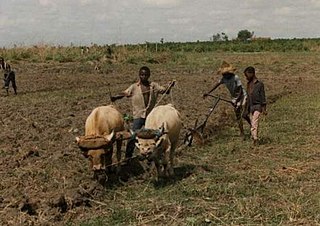
The economy of Botswana is currently one of the world's fastest growing economies, averaging about 5% per annum over the past decade. Growth in private sector employment averaged about 10% per annum during the first 30 years of the country's independence. After a period of stagnation at the turn of the 21st century, Botswana's economy registered strong levels of growth, with GDP growth exceeding 6-7% targets. Botswana has been praised by the African Development Bank for sustaining one of the world's longest economic booms. Economic growth since the late 1960s has been on par with some of Asia's largest economies. The government has consistently maintained budget surpluses and has extensive foreign-exchange reserves.

The economy of Lesotho is based on agriculture, livestock, manufacturing, mining, and depends heavily on inflows of workers’ remittances and receipts from the Southern African Customs Union (SACU). Lesotho is geographically surrounded by South Africa and is economically integrated with it as well. The majority of households subsist on farming. The formal sector employment consist of mainly the female workers in the apparel sector, the male migrant labor, primarily miners in South Africa for 3 to 9 months and employment in the Government of Lesotho (GOL). The western lowlands form the main agricultural zone. Almost 50% of the population earn income through informal crop cultivation or animal husbandry with nearly two-thirds of the country's income coming from the agricultural sector.
The Child Labour Programme of Action is the national plan on elimination of child labour in South Africa. It was provisionally adopted by a large group of key stakeholders in September 2003. These stakeholders include key government departments, including those responsible for labour, education, provincial and local government, water service, justice, policing, prosecution, social development, and education. The lead department is the Department of Labour. It was previously known as the Child Labour Action Programme, but was renamed in February 2006 because of the negative connotation attached to the abbreviation CLAP.
The Survey of Activities of Young People (SAYP) is a national household-based survey of work-related activities among South African children, conducted for the first time in 1999 by Statistics South Africa.
A Child Labour Programme of Action, sometimes called a Child Labour Action Programme or Action Programme on the Elimination of Child Labour (APEC) is a national programme aimed at addressing child labour within a given country. It includes, but is not restricted to, the Worst Forms of Child Labour.
The programme Towards the Elimination of the worst forms of Child Labour (TECL) is a programme on child labour and related issues that is run in all the countries of the Southern African Customs Union (SACU), namely Botswana, Lesotho, Namibia, South Africa and Swaziland.
The South African Child Labour Programme of Action has identified Children used by adults in the commission of crime (CUBAC), one of the Worst Forms of Child Labour, as a priority area for action on child labour in South Africa.
The International Labour Organization Worst Forms of Child Labour Convention calls for time-bound programmes for the eradication of the worst forms of child labour. Countries ratifying this Convention must take immediate and effective measures to secure the prohibition and elimination of the worst forms of child labour (WFCL) as a matter of urgency.

The Common Monetary Area (CMA) links South Africa, Namibia, Lesotho and Eswatini into a monetary union. It is allied to the Southern African Customs Union (SACU).
Little is known about the nature and extent of child labour in Botswana, although recent studies have shown that the phenomenon does occur in the country.
Child labour in Eswatini is a controversial issue that affects a large portion of the country's population. Child labour is often seen as a human rights concern because it is "work that deprives children of their childhood, their potential and their dignity, and that is harmful to physical and mental development," as defined by the International Labour Organization (ILO). Additionally, child labour is harmful in that it restricts a child's ability to attend school or receive an education. The ILO recognizes that not all forms of children working are harmful, but this article will focus on the type of child labour that is generally accepted as harmful to the child involved.
Child labour in Namibia is not always reported. This involved cases of child prostitution as well as voluntary and forced agricultural labour, cattle herding and vending.

The 2011 Commonwealth Youth Games, officially known as the IV Commonwealth Youth Games is a multi-sport event which took place in the British Crown Dependency of Isle of Man from 7 to 13 September 2011. As per the original quadrennial cycle, the Games were scheduled for 2012. However, the Commonwealth Games Federation at its general assembly in 2005 decided to move the Games within one year before the Summer Olympics. The Bowl Stadium at the National Sports Centre, Douglas staged the opening ceremony on 7 September 2011. The closing ceremony was held on Douglas Promenade & the Villa Marina on 13 September.

Edcon Limited is a retail company based in Johannesburg, South Africa. Its subsidiaries include Edgars, a department store with 203 branches.
Education in Eswatini includes pre-school, primary, secondary and high schools, for general education and training (GET), and universities and colleges at tertiary level.

Botswana–Namibia relations refers to the current and historical relationship between Botswana and Namibia. As of 2009, relations were considered friendly, with the two neighboring countries cooperating on economic development. Botswana gained independence from Britain in September 1966. Namibia gained independence from South Africa in 1990 following the Namibian War of Independence, and the two countries soon after established formal diplomatic relations. Botswana has a high commission in Windhoek. Namibia has a high commission in Gaborone.
The Botswana women's national football team nicknamed 'The Zebras' (Female) is the women's national football team of the Botswana and is controlled by the Botswana Football Association. It has never qualified for a major tournament.

Mobile technology in Africa is a fastest growing market. Nowhere is the effect more dramatic than in Africa, where mobile technology often represents the first modern infrastructure of any kind. Only 10% of Internet users are in Africa. However, 50% of Africans have mobile phones and their penetration is expanding rapidly. This means that mobile technology is the largest platform in Africa, and can access a wide range of income groups. AppsAfrica reports Mobile App downloads will reach 98 billion which will have a huge benefit for mobile app developers in Africa

Child labour in Africa is generally defined based on two factors: type of work and minimum appropriate age of the work. If a child is involved in an activity that is harmful to his/her physical and mental development, he/she is generally considered as a child labourer. That is, Any work that is mentally, physically, socially or morally dangerous and harmful to children, and interferes with their schooling by depriving them of the opportunity to attend school or requiring them to attempt to combine school attendance with excessively long and heavy work. Appropriate minimum age for each work depends on the effects of the work on the physical health and mental development of children. ILO Convention No. 138 suggests the following minimum age for admission to employment under which, if a child works, he/she is considered as a child laborer: 18 years old for hazardous works, and 13–15 years old for light works, although 12–14 years old may be permitted for light works under strict conditions in very poor countries. Another definition proposed by ILO’s Statistical Information and Monitoring Program on Child Labor (SIMPOC) defines a child as a child labourer if he/she is involved in an economic activity, and is under 12 years old and works one or more hours per week, or is 14 years old or under and works at least 14 hours per week, or is 14 years old or under and works at least one hour per week in activities that are hazardous, or is 17 or under and works in an “unconditional worst form of child labor”.

Sports in Botswana is widely reported on and documented by the popular local online publication sportsbw.com. All sporting codes in the country are regulated by the Ministry of Sports of Botswana. The government ministry works closely with the Botswana National Olympic Committee and various sports governing bodies, including the Botswana Football Federation.








